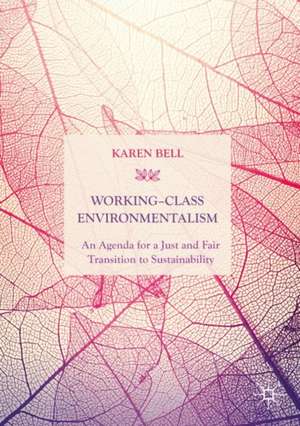Working-Class Environmentalism: An Agenda for a Just and Fair Transition to Sustainability
Autor Karen Bellen Limba Engleză Paperback – 11 ian 2020
Bell argues that environmentalism is a class issue, and confronts some current practice, policy and research that is preventing the attainment of sustainability and a healthy environment for all. She combines two of the biggest challenges facing humanity: that millions of people around the world still do not have their social and environmental needs met (including healthy food, clean water, affordable energy, clean air); and that the earth’s resources have been over-used or misused.
Bell explores various solutions to these social and ecological crises and lays out an agenda for simultaneously achieving greater well-being, equality and sustainability. The result will be an invaluable resource for practitioners and policy-makers working to achieve environmental and social justice, as well as to students and scholars across social policy, sociology, human geography, and environmental studies.
Preț: 200.69 lei
Nou
Puncte Express: 301
Preț estimativ în valută:
38.41€ • 39.87$ • 32.02£
38.41€ • 39.87$ • 32.02£
Carte disponibilă
Livrare economică 01-15 martie
Livrare express 15-21 februarie pentru 27.53 lei
Preluare comenzi: 021 569.72.76
Specificații
ISBN-13: 9783030295189
ISBN-10: 3030295184
Pagini: 280
Ilustrații: X, 292 p. 1 illus.
Dimensiuni: 148 x 210 x 24 mm
Greutate: 0.4 kg
Ediția:1st ed. 2020
Editura: Springer International Publishing
Colecția Palgrave Macmillan
Locul publicării:Cham, Switzerland
ISBN-10: 3030295184
Pagini: 280
Ilustrații: X, 292 p. 1 illus.
Dimensiuni: 148 x 210 x 24 mm
Greutate: 0.4 kg
Ediția:1st ed. 2020
Editura: Springer International Publishing
Colecția Palgrave Macmillan
Locul publicării:Cham, Switzerland
Cuprins
1. Introduction: Environmental Classism.- 2. Class and Classism.- 3. Carrying the Environmental Burdens.- 4. The Environmental Policy Makers.- 5. The Environmental Policy Influencers.- 6. Working-Class Environmentalism.- 7. Explaining Environmental Classism?.- 8. Supporting Working-Class Environmentalism.
Notă biografică
Karen Bell is Senior Lecturer in Geography and Environment at the University of West England, UK.
Textul de pe ultima copertă
“At last, a book that properly explores the huge significance of social class in environmental issues, and environmentalism. ...This book asks some difficult questions, and offers some uncomfortable answers but, in doing so, will hopefully wake British environmentalism from its slumber over issues around class and injustice. And definitely not before time.” —Craig Bennett, CEO, Friends of the Earth England and Wales, UK
“This book argues that class is everywhere. Karen Bell shows how disproportionately environmental issues affect the working class, points the finger clearly at the structures of capitalism, and connects issues of class inequality to environmental inequality.”—Lisa McKenzie, Assistant Professor in Sociology, University of Durham, UK
“Using evidence, analysis and her own hard-won experience, Karen Bell documents the way that environmental hazards and degradation impact more on working class people. Yet at the same time much environmentalist thinking undervalues working class lives and ignores their voices. This can in turn foster green policies focused too much on moralising and behaviour change rather than structural causes.”—Ian Gough, Professor Emeritus of Social Policy, LSE, UK This book presents a timely perspective that puts working-class people at the forefront of achieving sustainability.
Bell argues that environmentalism is a class issue, and confronts some current practice, policy and research that is preventing the attainment of sustainability and a healthy environment for all. She combines two of the biggest challenges facing humanity: that millions of people around the world still do not have their social and environmental needs met (including healthy food, clean water, affordable energy, clean air); and that the earth’s resources have been over-used or misused.
Bell explores various solutions to these socialand ecological crises and lays out an agenda for simultaneously achieving greater well-being, equality and sustainability. The result will be an invaluable resource for practitioners and policy-makers working to achieve environmental and social justice, as well as to students and scholars across social policy, sociology, human geography, and environmental studies.
“This book argues that class is everywhere. Karen Bell shows how disproportionately environmental issues affect the working class, points the finger clearly at the structures of capitalism, and connects issues of class inequality to environmental inequality.”—Lisa McKenzie, Assistant Professor in Sociology, University of Durham, UK
“Using evidence, analysis and her own hard-won experience, Karen Bell documents the way that environmental hazards and degradation impact more on working class people. Yet at the same time much environmentalist thinking undervalues working class lives and ignores their voices. This can in turn foster green policies focused too much on moralising and behaviour change rather than structural causes.”—Ian Gough, Professor Emeritus of Social Policy, LSE, UK This book presents a timely perspective that puts working-class people at the forefront of achieving sustainability.
Bell argues that environmentalism is a class issue, and confronts some current practice, policy and research that is preventing the attainment of sustainability and a healthy environment for all. She combines two of the biggest challenges facing humanity: that millions of people around the world still do not have their social and environmental needs met (including healthy food, clean water, affordable energy, clean air); and that the earth’s resources have been over-used or misused.
Bell explores various solutions to these socialand ecological crises and lays out an agenda for simultaneously achieving greater well-being, equality and sustainability. The result will be an invaluable resource for practitioners and policy-makers working to achieve environmental and social justice, as well as to students and scholars across social policy, sociology, human geography, and environmental studies.
Caracteristici
Presents solutions for developing green transitions which benefit, include and respect working-class people Argues that working class people tend to carry the environmental burdens for society; are excluded from and alienated by traditional forms of environmentalism; are sometimes negatively impacted by environmental policy; are, and continue to be, environmentalists Challenges current practice, policy and thinking by highlighting how discriminatory and undermining actions and attitudes towards working-class people are preventing the attainment of sustainability
